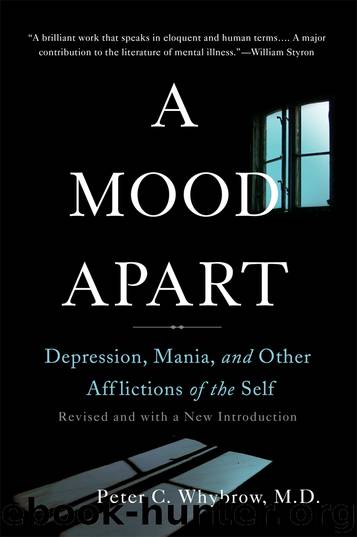A Mood Apart by Peter C. Whybrow

Author:Peter C. Whybrow [Whybrow, Peter C.]
Language: eng
Format: epub
ISBN: 9780465098941
Publisher: Basic Books
NINE
PILLS TO PURGE MELANCHOLY
Neurons, Chemistry, and the Pharmacology of Mood
It wasn’t until I was on medication that I could start dealing with the emotional issues. Psychotherapy has helped me tremendously, but had the therapy preceded the medication, I’d have been on the couch for the rest of my life.
SUSAN DIME-MEENAN, EXECUTIVE DIRECTOR, NATIONAL DEPRESSIVE AND MANIC-DEPRESSIVE ASSOCIATION, McCALL’S MAGAZINE, OCTOBER 1994
I came forward because I was helped. I owe it to let people out there understand it [depression] can be treated. You can get better and it is not all that difficult if you hang in there.
MIKE WALLACE, AMERICAN JOURNALIST, LARRY KING LIVE, CABLE NEWS NETWORK, APRIL 22, 1996
The medical students stamped their feet in enthusiastic applause. Even as I rose to thank Melanie Branch for her special contribution to my lecture I could see eager individuals threading their way, past classmates and book bags, to the podium where she stood. It was a sight familiar to me. The first-year students in the neuroscience class, struggling for a fledgling understanding of mind and brain, invariably found Melanie’s frank discussion of her personal fight with bipolar illness provocative and stimulating. It awakened in many of them a genuine intellectual curiosity about these disorders of the emotional self, and in others a deeper concern about the suffering of friends and family, and themselves.
Melanie Branch was one of a number of patients who assisted me with my teaching responsibilities when I was a professor at the University of Pennsylvania. She was a woman of courage and persistence, qualities not easily dismissed by those who cling to the stereotype of the mentally ill as individuals who have failed in life through a weakness of will—not even by medical students, suspicious of individual testimony as information apart from their regular “scientific” diet of body organs and molecular biology. These personal strengths had sustained Melanie through times of exhausting disability, including a manic psychosis after the birth of her only daughter, and they have carried her also beyond a sense of shame about her illness. Melanie was now an articulate advocate for better public education about manic depression.
A cluster of ardent students had gathered around Melanie. “Before you became ill, were you aware there was something wrong with you?” asked one. “How do you feel about taking lithium for the rest of your life?” inquired another. The gaggle of voices grew, each competing to be heard. One woman, somewhat older, wanted to know whether Melanie’s moods affected her relationship with her daughter. “May I call you?” pleaded a tall, athletic-looking fellow. “I really admire your courage in talking to us. My mother was just diagnosed with bipolar illness.” His pain and confusion were palpable. “We’ve all known there was something wrong, for years, and it would help me a lot to talk to you—to understand more.” Without hesitation, Melanie agreed.
For me, remembering my own introduction to severe mental illness, such moments represent a small miracle. As a young student in England, on the cusp of deciding
Download
This site does not store any files on its server. We only index and link to content provided by other sites. Please contact the content providers to delete copyright contents if any and email us, we'll remove relevant links or contents immediately.
Should I Stay or Should I Go? by Ramani Durvasula(6784)
Why We Sleep: Unlocking the Power of Sleep and Dreams by Matthew Walker(5640)
Fear by Osho(4085)
Flow by Mihaly Csikszentmihalyi(4051)
Rising Strong by Brene Brown(3780)
Why We Sleep by Matthew Walker(3771)
Too Much and Not the Mood by Durga Chew-Bose(3693)
How to Change Your Mind by Michael Pollan(3673)
The Hacking of the American Mind by Robert H. Lustig(3579)
Lost Connections by Johann Hari(3454)
He's Just Not That Into You by Greg Behrendt & Liz Tuccillo(3300)
Evolve Your Brain by Joe Dispenza(3049)
What If This Were Enough? by Heather Havrilesky(2945)
Resisting Happiness by Matthew Kelly(2886)
Crazy Is My Superpower by A.J. Mendez Brooks(2858)
The Courage to Be Disliked by Ichiro Kishimi & Fumitake Koga(2795)
The Book of Human Emotions by Tiffany Watt Smith(2770)
Descartes' Error by Antonio Damasio(2731)
In Cold Blood by Truman Capote(2684)
